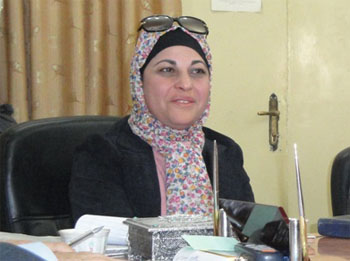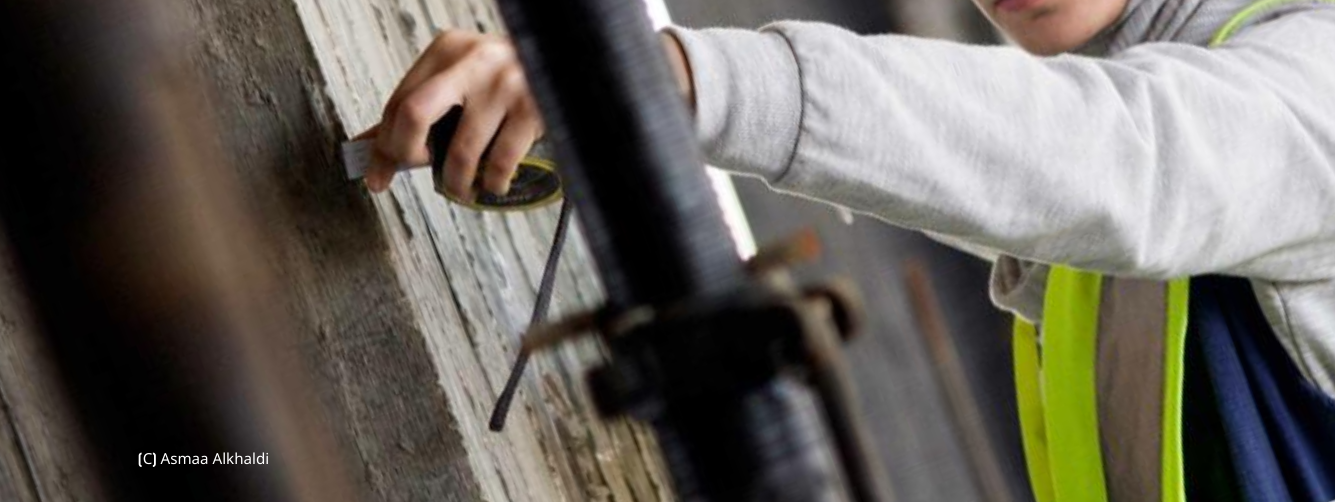
“I have always wanted to learn more, and thanks to MIFTAH, a new phase in my life has begun,” says Suheir Khatib. “Before, I had no idea about how municipalities worked,” she admits. Today, she holds the position of deputy mayor of Ateel’s municipality.
Khatib is not the only woman in the municipality. Two other women from the town are also members, all of whom attended MIFTAH’s workshops, participated in exchange visits and learned ways of addressing the media. “Before all this, the municipality was just a building to us,” says Khatib. “Now we will never accept to be a mere prop in it. “We make our presence known now. If we stayed at home, we would never have learned all this.”
When MIFTAH visited Khatib and mayor, Nasha’at Abu Daqa at the municipality, they were getting ready to welcome a large group of students and teachers from the Ateel Girls’ School to give them a tour of the municipality and explain itsroles and responsibilities and the services provided. When the group came, Khatib welcomed the students and teachers, first introducing MIFTAH and explaining its role in supporting and empowering the Palestinian women to be leaders.
Mayor Abu Daqqa and Khatib took turns explaining to the group about the roles of the municipality, with Khatib speaking with confidence and ease to the group. The mayor and his deputy equally took and answered questions from the students and teachers about the municipality’s roles and services provided to the local community.
Khatib says Ateel is unique in its approach to build open relationship between the municipality and the community, saying she and her female colleagues have received a lot of support from the community, which allowed her to maintain her position today. MIFTAH’s training and workshops further enhanced this experience, which she says allowed her to fulfill her leadership role in the best possible manner.
Khatib admits that before the workshops she knew nothing about the women’s quota. She says before she actually decided to run in the local council elections, she was merely “placed” on the list. “I had people telling me I would never win, but then I met Um Ahmad (MIFTAH‘s field coordinator in Tulkarem), who had participated in several of MIFTAH’s workshops,” she says. “We’ve been supported and encouraged by Miftah’s field coordinator and the trainers, I received special support from Dr. Raja’ Sarghali, MIFTAH’s coordinator in our district.”
So, what was her experience like after she won a seat in the municipality? “In general, people in Ateel accepted my presence as a woman in the municipality as well as my co-workers. Except for a few, who were not satisfied that a woman become a deputy mayor.”
Still, she pushed on, saying the fact that she was able to do her work so well changed many preconceptions and prejudices among some council members who had reservations about her rewarded position.
When problems arose, Khatib said she would turn to Sarghali for advice. “She was my main reference point,” admits Khatib. This continuous communication between Khatib, with her capacity as a member of one of the largest municipalities in Tulkarm district, and MIFTAH, is a proof of the sustainable communication relationship between the both sides.
Khatib’s newfound status has also encouraged women in her town to come to her with specific grievances including issues pertaining to their social and economic situation. She says the women find it easier to come to her with their problems than to the mayor or other male council members.
Khatib’s success story does not end with winning in local council elections though. She helped to economically empower the women of Ateel by holding a cooking course in Al Tireh College, also assist to market their products. She says such empowerment will advance and support their active roles and increase their effectiveness in society.
Mayor Nasha’at Abu Daqqa has also played a pivotal role in Khatib’s success through his continuous support. He says Khatib’s presence in the municipality and her strong personality sets Ateel’s municipality apart from others, “something which we are very proud of.”
Abu Daqqa, Khatib and the other two women council members, all ran for local elections under the same electoral list and won. They work according to a two-year rotation for the position of mayor, with full equality between men and women.
The two say they fully cooperate on making decisions along with the other council members, in carrying out and following up on vital projects in the town and in providng municipal services.
Suheir Khaled’s is a success story on several levels. At the personal level she has taken on an important leadership role in her community. For Ateel, it has gained a strong, independent and qualified woman in its municipality. For MIFTAH, this is also a success, because it was with Khatib from day one of her leadership journey, which has brought her to where she is now. A Leader.






